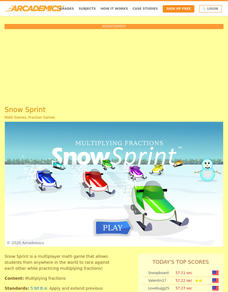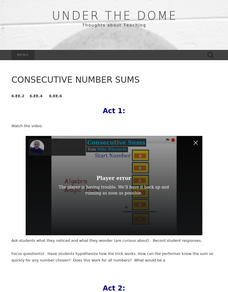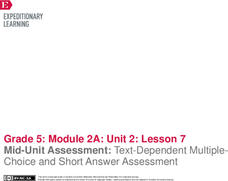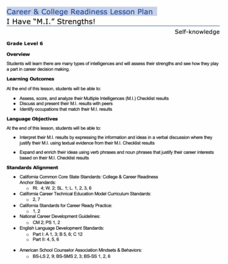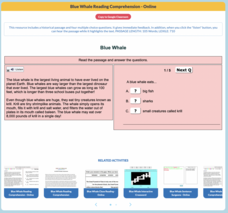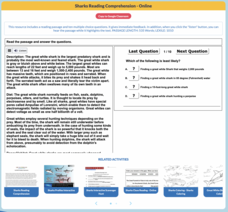Arcademics
Snow Sprint
Dash through the snow with fractions. Players race snowmobiles while multiplying fractions. By choosing the correct products, learners make their online game pieces move around the track. The faster the correct answer, the quicker the...
EngageNY
Mid-Unit 3 Assessment: Drafting the Position Paper
Organize your thoughts! Scholars work on the drafts of their position papers about sustainable water management. The draft serves as their mid-unit assessment. Before beginning, the class discusses the prompt and then learners work...
EngageNY
Building Background Knowledge: The Myth of Cronus
Scholars look at and describe a picture of Cronus and Rhea and discuss the process of making predictions. Learners then use the images to write a prediction about the myth of the gods on an index card before completing guided...
EngageNY
Writing to Inform: Analyzing a Model Using a Rubric
Learn to write right. Scholars analyze the model essay Adversity Faced by Townspeople in the Middle Ages. They discuss the essay and make annotations working with an elbow partner. Learners then take another look at the essay using a...
EngageNY
Drafting Introduction and Conclusion
In conclusion ... Scholars analyze the model essay Adversity Faced by Townspeople in
the Middle Ages to gain a better understanding of introductory and concluding paragraphs. After studying the author's strategies, learners begin...
EngageNY
Qualities of a Strong Literary Essay
Put it all into words. Scholars work toward writing an argumentative essay. They begin by examining and marking strong words in Are We Medieval? A Literary Argument Essay Prompt. Learners then use Qualities of a Strong Literary Argument...
EngageNY
Researching: Eyewitness Accounts, Part 2
Continue on. Learners continue with the work they began in the last lesson looking for quotes to complete an eye witness interview. Pupils work in their groups to examine the texts in their research folders and The Great Earthquake and...
EngageNY
Introducing World without Fish
One fish, two fish, red fish, no fish. Scholars analyze World without Fish to determine the gist, identify vocabulary, and answer text-dependent questions. As learners read, they use sticky notes to annotate the text. They also work...
EngageNY
Tracing the Idea of Fish Depletion: Chapter 2
Scholars read chapter two of World without Fish to learn more about the fishing industry. Learners discuss in triads what it means for fishing to become an industry. They then write the gist of pages 28-33 on sticky notes and answer...
Under the Dome
Consecutive Number Sums
Determine equivalent methods to find sums of consecutive numbers. Learners watch a video of a computer program that finds the sum of five consecutive numbers given a starting number. Pupils hypothesize how to determine the sum without...
EngageNY
Mid-Unit Assessment: Text-Dependent MultipleChoice and Short Answer Assessment
Shout it from the rooftops. Scholars take a mid-unit assessment of their reading thus far in The Most Beautiful Roof in the World. Learners answer multiple choice, short answer, and fill in the blank questions relating to pages...
C-SPAN
Choice Board - Conversations with Suffragists
Celebrate 100 years of women's suffrage by planning a re-enactment of famous women discussing their fight. After learners view a series of interviews with famous women played by actors, including Susan B. Anthony, Sojourner Truth, and...
EngageNY
The Painted Essay: The Introductory Paragraph
Mimic the model for the perfect essay. Scholars work in groups to analyze a model painted essay The Electric Motor. They compare the structure of the model essay to the painted essay template they created in the previous activity. The...
EngageNY
Synthesizing from Informational Texts: Main Idea and Key Details from Promises to Keep (Pages 8– 10)
Learners determine the main idea of a timeline on pages eight and nine of the text Promises to Keep. They use the timeline to complete a Main Idea and Details note catcher and then share their thoughts with the class. To finish,...
California Department of Education
I Have “M.I.” Strengths!
Scholars complete an interest survey to discover their learning style. Based on their newfound knowledge, learners examine and discuss a list of careers that work best with their learning style.
EngageNY
Researching about the Red Cross, Continued: Who Is the Red Cross and What Does This Multinational Organization Do?
Code red! Learners read an informational article about the Red Cross, discussing the gist of the text in small groups. On a three-column note catcher, pupils take notes to show how the Red Cross functions as a multinational aid...
Mr. Nussbaum
Blue Whale
An interactive tests scholars' reading comprehension skills. After reading or listening to a brief informational text, learners answer five fill-in-the-blank questions. Results appear instantly.
Flipped Math
Special Right Triangles II
Show students that right triangles are radical. Learners see how the lengths of the sides of a 45-45-90 triangle relate. Using that relationship, pupils observe how to find any of the lengths given one side of a triangle. They go on to...
Flipped Math
Reflections
Take some time to reflect on graphing. Learners count a point's distance from the line of reflection to create reflections of geometric figures. Given the rules for four basic lines of reflections, pupils determine the points to create...
Amani Project
Teach the Mood Meter
The third activity from the Amani Project has youths create a Mood Meter. The colorful meter, divided into red, yellow, blue, and green squares, lets participants indicate not only how they are feeling but also permits them to indicate...
Mr. Nussbaum
Sharks
Learners read an informational text about sharks, then test their knowledge by answering 10 questions.
K20 LEARN
Grandmother, What A Big Culture You Have!: Cultural Characteristics
A word splash activity introduces scholars to the lesson's theme—cultural characteristics. First, in examining Little Red Riding Hood by The Brothers Grimm, learners highlight the cultural characteristics and then spot the...
K20 LEARN
Allotment in Indian Territory: Land Openings in Indian Territory
To understand how the allotment policy embedded in the Dawes Act, passed by the U.S. government in 1887, affected the tribal sovereignty of Native Americans, young historians examine various maps and documents and Supreme Court...
Utah Education Network (UEN)
8th Grade Poetry: Sonnet Poem
The third lesson of five in an eighth-grade poetry unit has young scholars comparing Shakespearean sonnets with Petrarchan sonnets. To begin, they examine the different structures of the two forms and their different rhyme schemes. After...
Other popular searches
- Diverse Learners
- Kinesthetic Learner
- English Language Learners
- Adult Learners
- Kinesthetic Learner Math
- Literacy Kinesthetic Learner
- Diversity of Learners
- Second Language Learners
- English Learners
- Learner Log
- Lessons for Diverse Learners
- Community of Learners
